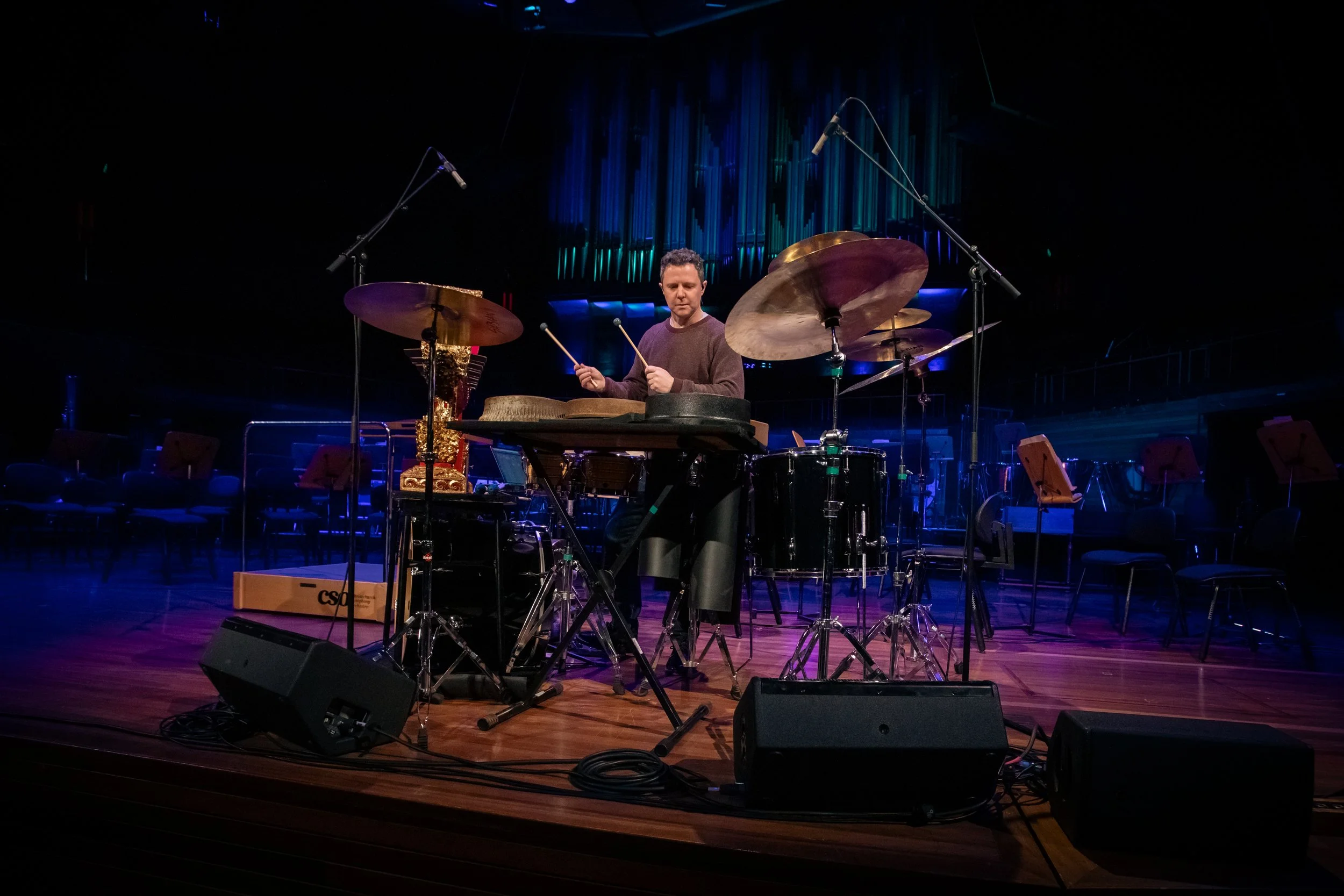TOWARDS MIDNIGHT: Percussionist Justin DeHart explores our unknown future
Percussionist Justin DeHart
Album review by guest writer Cadence Chung
Justin DeHart’s new album Towards Midnight opens with a bang — quite literally! The very first moment of the album is a colossal crash, inviting the listener into the next hour or so of frenetic, vibrant percussion. This opening herald is Macet by iconic New Zealand composer Gareth Farr, which combines drums and electronics with Balinese gamelan. Its title translates to ‘traffic jam’ in Balinese — the gamelan drives steadily against the unpredictable crash of the drum set, which swerves randomly like a haphazard taxi cab.
This vast range of sonorities is characteristic of DeHart’s work as a percussionist. His previous New Zealand percussion music album, Landfall, combines electronics with techniques involving hands, brushes, tuning, and even the sound of two stones against each other. Towards Midnight, his second release with Rattle, feels even more expansive.
TOWARDS MIDNIGHT
New Zealand Percussion Volume 2
Having performed with the Los Angeles Percussion Quartet and appeared in over 100 albums, DeHart came to Aotearoa to teach at the University of Canterbury in 2017. It feels very special for him to highlight these new works by New Zealand composers — promoting our country’s contemporary music is a much-needed mission.
The concept for this second album dates from 2021, when DeHart invited significant Kiwi composers to write new percussion solos. DeHart himself speaks of the importance of such collaboration, saying that ‘it was an absolute pleasure to work with each artist to develop pieces that celebrate the collaborative spirit of artistic expression and connection’.
Much like the album’s music, its title has many facets of meaning. On a simple level, it refers to the literal time that DeHart recorded the pieces, with midnight being optimal for recording, free of outside noise. Deeper than that, it also alludes to what the percussionist refers to as an ‘unknown future’, hoping that this music ‘may inspire a more compassionate and sensitive consciousness in the world’.
John Psathas’ Infinite Mind offers yet another meaning for ‘midnight’. This two-part composition is centred around a 2023 recorded interview with Noam Chomsky, the American professor and public intellectual. Soaring over a blend of marimba and wave-like electronics, Chomsky’s eloquent musings reflect upon nuclear war, climate change, and human consciousness. Its first section, Terminal, opens with Chomsky talking about the ‘Doomsday Clock’, a system used in the Cold War to track the threat of nuclear destruction. In this system, ‘midnight’ means that nuclear war is certain, with the number of minutes until midnight showing how close the threat is — yet another way that DeHart plays the rhetoric of this collection. Yet despite the seriousness of the topics explored, Psathas’ work never becomes gloomy, with its second movement touching on the wonder of parenthood, and the human mind’s ‘infinite thoughts’.
A break from this sensory intensity comes with Phil Dadson’s Kōrero Kōhatu — a conversation with stones. In a captivating display of serenity, DeHart creates subtle rhythms with the whispering sound of stones and other natural items. The beginning section brings to mind the sound of footsteps on gravel, while a later moment reminds me of a neighbour’s windchimes blowing in the breeze.
The set-up for Phil Dadson’s Kōrero Kōhatu — a conversation with stones
…exploring natural sound sources
Antonia Barrett McIntosh’s short work to conduct them to begins with a similar sense of organicism, opening out into an eerie blend of electronics and bells, strange scraping sounds evoking a feeling of doom. The album closes with James Gardner’s Traps, a piece that primarily uses a traditional drum set, creating a nice cyclical quality, given the bold drum opening in Farr’s Macet. In the 21-minute piece by Gardner, DeHart’s stops and starts create an unpredictability that draws the listener in, the lack of a steady metre ensuring we listen closely. This evocation seems fitting for DeHart’s constant experimentation and development of new works — he leaves us wondering what he’ll do next.
TOWARDS MIDNIGHT Justin DeHart (percussionist) New Zealand Percussion Vol 2 (available from RATTLE)
You can read the Five Lines review of Justin DeHart’s first album of New Zealand Percussion works, LANDFALL, here.



